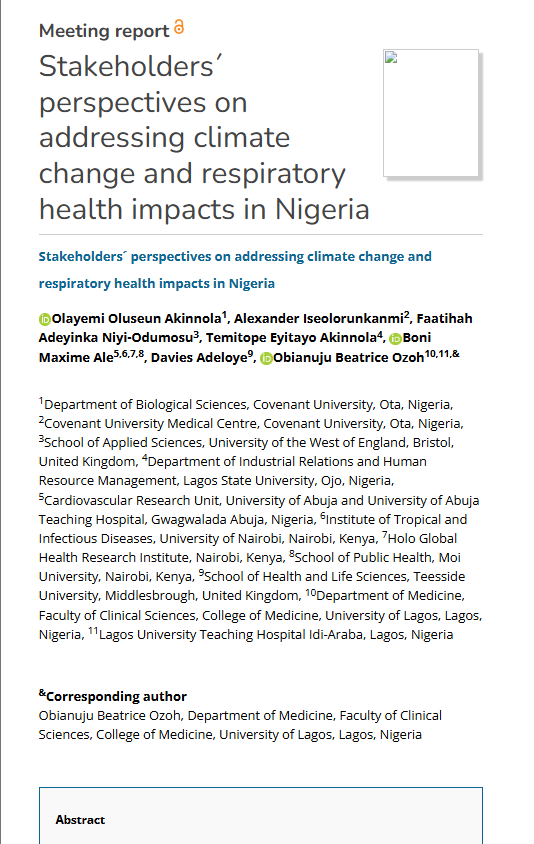Stakeholders´ perspectives on addressing climate change and respiratory health impacts in Nigeria
Last Update : 15 May, 2025
Lay Summary
Climate change is making it harder for people to stay healthy in Nigerian cities like Lagos and Ogun, especially when it comes to breathing problems. To help find solutions, a team called the C2Rest Nigeria Study organized a meeting on April 23, 2024. They brought together 42 people, including government officials, health workers, teachers, and community leaders, to talk about how climate change is affecting health.
During the meeting, people shared ideas through group discussions, notes, and recordings. They talked about what’s causing climate change, what’s stopping people from acting, and how communities can adapt.
Most people agreed that the poorest people, pregnant women, children, older adults, and those with health problems are the most at risk. A big problem is that some people believe climate change is caused by God or spirits, so they don't take action. Money issues were also a major barrier to doing anything about it.
Overall, this meeting helped highlight who is most at risk and what is stopping people from fighting climate change in Nigeria.
Abstract
The impacts of climate change on respiratory health are increasingly becoming a significant challenge in Nigerian cities, particularly in Lagos and Ogun States. Engaging stakeholders in discussions about climate change and health is crucial for addressing these challenges. The climate change and respiratory health (C2Rest) Nigeria Study team facilitated a stakeholder engagement to discuss climate change and health impacts in Nigeria, aiming to explore feasible solutions relevant to research, policy, and practice. A stakeholder meeting was conducted on April 23rd, 2024, involving participants from Lagos and Ogun States. The framework for the activities was adapted from Gardner´s climate change engagement pathways, which examine key drivers (8 questions), barriers (7 questions), and adaptation pathways (3 questions). Data were collected through note-taking, written contributions, audio and video recording, and subsequently transcribed and analysed thematically. A total of 42 registered participants, comprising government officials, academicians, healthcare professionals, community and religious leaders, attended the stakeholder engagement meeting. Participants made group presentations and submitted a total of 380 written contributions. There were varying views on the drivers of climate change, but there was consensus that the most vulnerable populations include the poor, homeless, pregnant women, children, the elderly, and individuals with underlying health conditions. An important barrier identified was the sociocultural belief that climate change is an act of God or spirits. Financial constraints were a recurrent theme in discussions about mitigation and adaptation to climate change. This report provides valuable information on the most vulnerable population to the effects of climate change in Nigeria and identifies sociocultural beliefs and financial constraints as key barriers to the adoption of effective mitigation and adaptation behaviors.
Read Full Publication : https://www.panafrican-med-journal.com/content/article/51/14/full/

